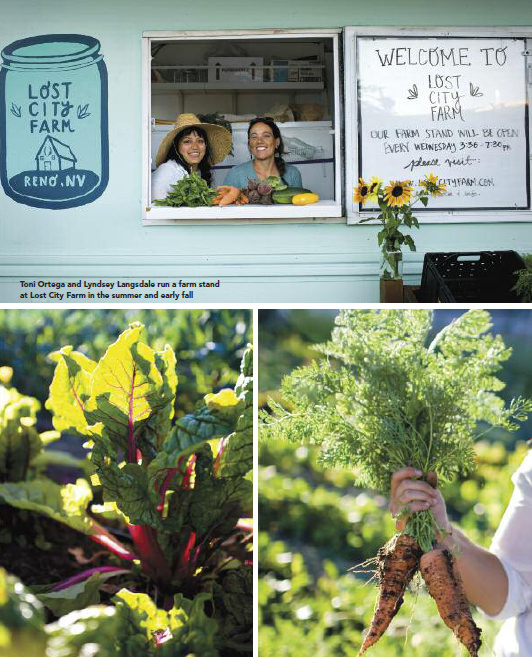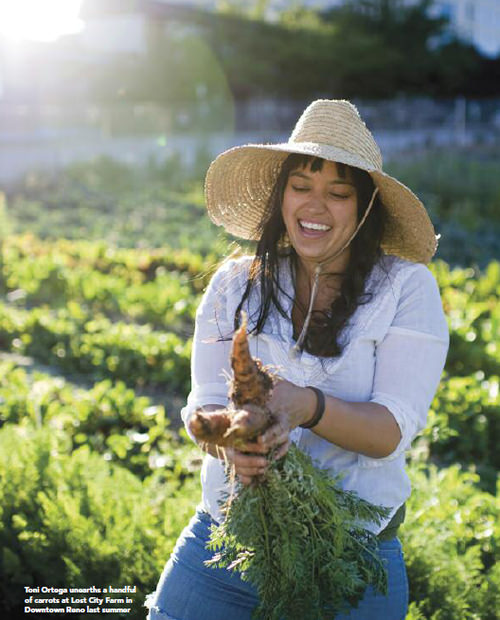meet the farmer
URBAN JUNGLE
Pioneering farmers change downtown Reno’s landscape.
WRITTEN BY SUE EDMONDSON
PHOTOS BY CANDICE NYANDO
If it’s hard to imagine an anthropologist and artist/cultural geographer teaming up to pioneer laws that allow for commercial urban farming in Reno, or turning a barren city acre into a lush vegetable oasis and successful farming business, you haven’t met Lyndsey Langsdale and Toni Ortega.
They both laugh when asked why they farm.
“We’re crazy!” Ortega says.
The truth is they’re smart and funny, and they easily tie their education to urban farming.
“It’s about people and space,” Ortega says. “And you have to admit, farming is creative, kind of MacGyverish.”
A seed is planted
Lost City Farm started as a few bullet points on a cocktail napkin when the two, who became friends as University of Nevada, Reno undergrads, met for a drink years later to talk about the possibility of a farming venture. It was something neither imagined when they graduated and left Reno to follow other dreams.
Ortega had moved to New York to pursue art. What she found most striking was the lack of access to healthy food in the city.
“I became frightened by our priorities as a society,” Ortega says. “We know so little about food, and there aren’t many young farmers taking the reins. That has to change.”
She left New York to intern on farms in Sonoma and Nevada City. She loved every aspect of farming, except its rural nature.
“I’m young and want to live in a city, where I can go to a movie or out with friends after work,” Ortega says.
Meanwhile, Langsdale was in Arizona, earning a master’s degree in anthropology. Her thesis focused on community gardens.
“Both community gardens and playgrounds originated in the late 1800s,” Langsdale says. “While playgrounds stay, gardens are paved over in good times and pop back up when the economy suffers. I was curious about what cultural shift was needed to accept urban agriculture as a permanent part of the landscape.”

A garden blooms
With degree in hand, Langsdale returned to Reno to focus on her gardening skills. Ortega moved back after that, in November 2011. Within weeks, they met for that drink. They parted with a handshake agreement to start an urban farm and keep it going as long as it was fun.
“Fun is mandatory,” Ortega says.
Immediately, they met a major roadblock. Reno’s zoning codes prevented farming in multi-use zones. Undaunted, they lobbied City of Reno planning commissioners and city council members to remove the restrictions.
“It felt like we had no choice but to go forward,” Langsdale says. “We took the challenges as they came.”
An urban farm ordinance was approved. Now the search for space was on. They found one that met their bullet points — a visible, south-facing lot in a neighborhood, one acre in size — and sent an inquiry to the owner.
“We’d done our homework. We had a business plan, mission statement, liability insurance, and name,” Langsdale says.
“Our letter explained the benefits to the landowner,” Ortega explains. “We’d steward the land, and with this project, together we’d help make Reno the type of city where people want to stay. He was convinced.”
Growing success
With lease in hand, they prepped the lot. Thanks to help from local farmers and friends, by late spring 2013 they had planted their first crops. They opened a farm stand, created a loyal volunteer and customer base, and taught about urban farming throughout the community.
Like its namesake, an ancient Anasazi settlement and home to Nevada’s first farmers, Lost City Farm has set a precedent. Langsdale and Ortega are pleased with its progress.
“We wanted to help change how people think about food,” Ortega says.
One look at their accomplishments shows they have.
Freelancer Sue Edmondson has written for publications in Nevada and California. A fan of locally grown food, she’s delighted to see a farm in the heart of Reno.
More Info
Lost City Farm
512 S. Center St., Reno
http://www.Lostcityfarm.com & 775-815-1113
Check website for farm stand days and hours of operation
Recipe
“During farm season, we had a family dinner almost every Wednesday night after the big harvest farm stand day. This dish was a hit,” Ortega says.
Lost City Farm Kale and Quinoa Salad
(courtesy of Lyndsey Langsdale and Toni Ortega. Serves 4)
2½ cups water
1 cup quinoa
1 bunch Lost City Farm’s dino kale, sliced into thin strips
2 or 3 scallions, chopped
Zest and juice from 1 Meyer lemon
2 tablespoons walnut oil
½ cup pine nuts
Salt and pepper, to taste
Bring quinoa and water to boil over medium-high heat, cover, and reduce heat to medium-low for about 10 minutes.
While water is heating, toast pine nuts in dry skillet over low heat, stirring continuously for about 5 minutes or until lightly browned.
After quinoa has cooked and absorbed most of water, place kale on top of quinoa, and replace lid to steam kale, about 5 more minutes.
In large bowl, toss kale and quinoa with lemon juice, walnut oil, pine nuts, scallions, and salt and pepper. Top with lemon zest and serve warm, or chill for cold salad later.


